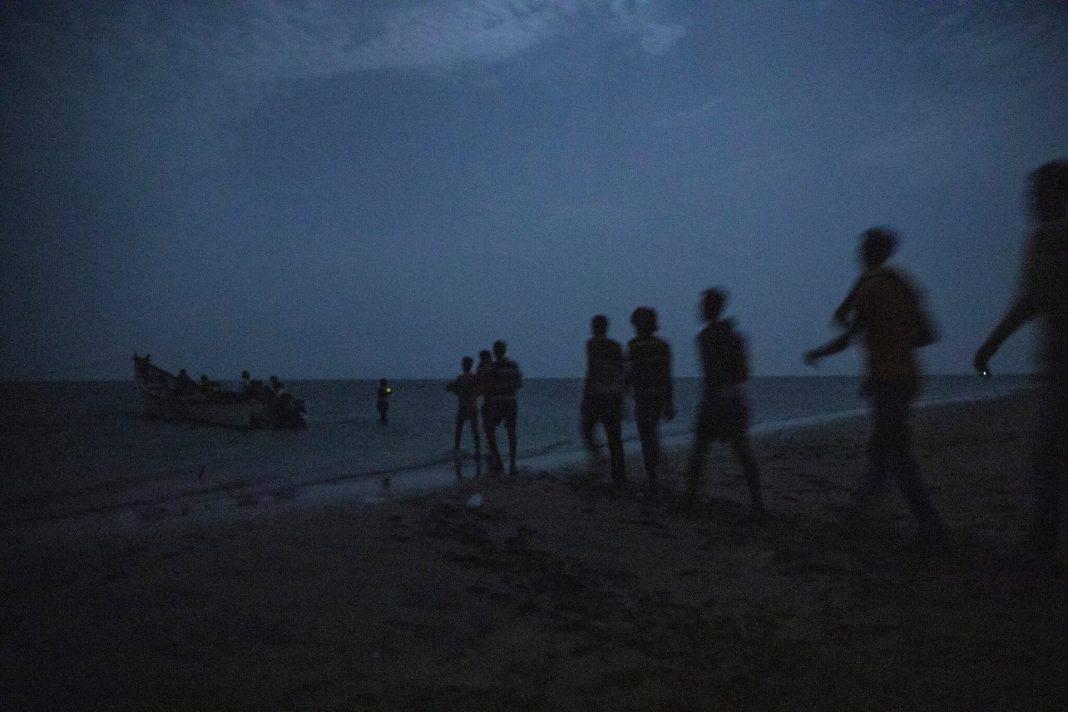Despite growing concern over the scale of human rights abuses in Saudi Arabia under the country’s crown prince and prime minister, Mohammed bin Salman, both the German federal police service and the US military have been involved in training Saudi border forces implicated by the UN and human rights NGOs in mass killings.
Significantly, the US training agreement – the funding for which ended last month – stipulated that the US was required to monitor how its training was being used, with those receiving training only allowed to operate defensively, to protect themselves and their sites from an attack.
The scale of the abuses was revealed by Human Rights Watch in a shocking report earlier this month. It alleged that Saudi border forces had used explosive weapons to target mainly Ethiopian migrants and asylum seekers attempting to cross the border from Yemen, claims that have been denied by Saudi Arabia.
Amid growing outcry over the claims, the Guardian has also been told that Saudi Arabia has increasingly treated illegal incursions across its borders as a counter-terrorism issue, authorising the use of lethal force.
The newspaper has also been told that Saudi Arabia employs extensive and centrally monitored electronic surveillance of the border area meaning it should be able to distinguish groups of trafficked civilians from those involved in armed incursions from Yemen or drug smuggling.
The disclosures elevate the question of whether Riyadh has been deliberately targeting migrants trying to cross the border, which Human Rights Watch has suggested would amount to a “crime against humanity” if it was established to be official policy.
The daily has established that the US military’s training of Saudi forces, including border forces, has been part of a long running military support programme known as MOI-MAG (Ministry of Interior-Military Assistance Group) with US involvement in training border forces beginning in 2008.
The agreement to train Saudi border forces required the Pentagon to draw up a unique technical cooperation agreement to allow US forces to train a non-military force for the first time, requiring the monitoring of the use to which US trained units were being put by the Saudis.
Confirming the long-running US training of Saudi border forces, a US official told the Guardian: “The US army Security Assistance Command provided border guards training, which had been funded for a period from 2015-2023, with the funding period ending in July of this year.”
The official did not explain why the funding had ended.
For its part, the German training of Saudi border forces was undertaken by the federal police.
Beginning in 2009, the programme continued well into 2020, with a brief interruption after the killing of Washington Post journalist Jamal Khashoggi in Saudi Arabia’s consulate in Turkey.
In 2015 the German programme came under fire again when a Saudi blogger, Raif Badawi, was sentenced to 1,000 lashes and 10 years in prison as punishment.
In 2017, after a visit by Germany’s Chancellor Angela Merkel to the kingdom, the training of Saudi Arabian border guards was formalised further with the German federal police announcing a wide ranging training programme at the Saudi border guard academy and its regional offices.
The German and US training missions ran in tandem with a wider effort by Saudi Arabia to upgrade its border security with surveillance technologies, which have raised additional serious questions over why Saudi authorities were unable to distinguish between civilians and armed individuals at the Yemen border.
Publicly issued tenders for the systems over recent years show Riyadh seeking a sophisticated and centralised surveillance network for its borders, including CCTV, thermal imaging, and ground motion sensors.
While it is unclear how many of those systems have been deployed, the Guardian has been told that real time surveillance capabilities have been installed in border areas, including the ability to monitor the border both from regional control rooms and also reportedly from Riyadh.
Eleonora Ardemagni, an Italian researcher into the Persian Gulf and Yemen, who has studied the increasing militarisation of the Saudi response on the border with Yemen, describes the policy as ever more highly centralised under the control of the ministry of the interior in recent years.
“Since 2015, and the start of the war in Yemen war [in late 2014], what I have been struck by on the Saudi side is the rise of multiple security players operating on the border. While this means more capacity, it also means it is even more difficult to understand who provides security on specific parts of the border,” said Ardemagni, who is at the Italian Institute for International Political Studies (ISPI).
Among new players who have emerged in tandem with the increase in migrant deaths is the Al Afwaj regiment, which answers directly to the ministry of the interior. There has also been an increase in the use of foreign forces, notably Sunni Yemenis recruited as contractors from that country’s south.
“This militarisation of the border comes at a time when the border issue has come to be seen by Saudi Arabia as a key national security issue,” Ardemagni stated, adding, “It is part of Riyadh’s understanding that the border issue will be more and more decisive in the way it manages not just the Yemeni dossier but in terms of economic security. They want to secure the border as a first priority and only then see if the Yemen parties can come to a durable ceasefire.”
Given the monitoring technology on the border and the increased centralisation of the response, Ardemagni is sceptical that the Saudis would not be aware of the circumstances of migrant deaths.
“The centralised approach to the border issue makes it less credible that the Saudis lack knowledge of what is happening there. However, the proliferation of security players also makes it harder to identify who is committing these alleged crimes without real cooperation by Riyadh.”
